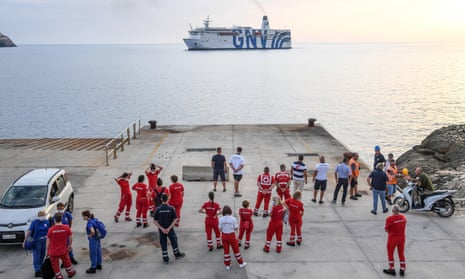Italian prosecutors are investigating the death of a 15-year-old boy held on a so-called “quarantine ship” as questions grow over the the use of the vessels to isolate asylum seekers in order to mitigate against outbreaks of Covid-19.
The teenage boy, Abou, who travelled from the Ivory Coast, was rescued on 18 September in the central Mediterranean by the Spanish NGO ship Proactiva Open Arms and transferred with 200 other migrants to a ferry off the coast of Sicily for quarantine.
According to several witnesses, Abou was very ill, dehydrated, malnourished and had evident signs of torture on his body but remained on the ship until 30 September when he was ordered to be transferred to a hospital in Palermo following a medical examination.
But it was too late and two days later, Abou, who had tested negative for Covid-19, fell into a coma. He died on Monday.
Italy began to use quarantine boats in April, during the height of the pandemic, when a government decree mandated the use of ferries moored off the coast to hold rescued refugees under quarantine for 14 days before transferring them to welcome centres located around the country.
There are at least three quarantine ships active in Italy, each of which carries hundreds of people.
The vessels have been criticised as harmful to the physical and mental health of people rescued at sea, as well as lacking the proper medical equipment to provide assistance to asylum seekers.
Prosecutors in Palermo on Tuesday launched an investigation into Abou’s death.
“We’re awaiting the results of the autopsy that will be carried out on Wednesday,” said Michele Calantropo, a lawyer in Palermo in charge of the case. “What emerges from preliminary investigations is the presence of only one physician aboard the ferry, which was carrying over 600 migrants.”
Proactiva Open Arms said it was grief-stricken by the teenager’s death. “The people we rescue are all in precarious health conditions. They’ve suffered abuse and torture and must be transferred to land as soon as possible and placed under quarantine in proper facilities.”
Mario Affronti, physician in charge of monitoring the health of migrants at Palermo’s Policlinico hospital, said: “These so-called quarantine ships serve the purpose of allaying Italians’ unjustified fears. These vessels aren’t only useless but they can also become very dangerous for the health of migrants. We’re talking about very vulnerable patients who need immediate assistance, who have withstood trauma and violence. Spending more time on a ship serves no purpose other than to worsen and intensify their physical and mental suffering.”
He added: “Abou was a minor. And minors, according to national and international laws, should not be on those ships. It is unacceptable that a 15-year-old boy died because of anti-Covid measures.”
Abou is the second person to have died while being held on one of the boats. A young Tunisian man quarantined on a ferry off the coast of Agrigento, Sicily, died in May after jumping into the water from a height of 15 metres (49ft) because of rough seas.
Forum Antirazzista, a collective of activists and associations in Palermo, held a protest in the Sicilian capital on Tuesday demanding answers. “We want to know what happens aboard those ships, which even carry children, and whose passengers seem invisible,” it said.
